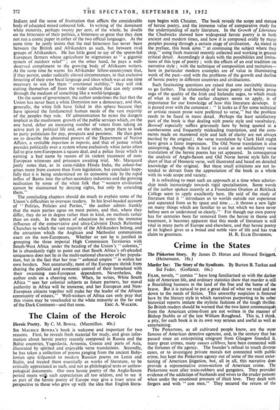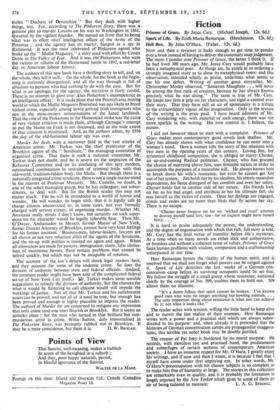Crime in the States
The Pinkerton Story. By James D. Horan and Howard Swiggett. (Heinemann. 18s.) Murder Inc: The Story of the Syndicate. By Burton B. Turkus and Sid Feder. (Gollancz. 16s.) Fruvis, novels, " comics " have long familiarised us with the darker side of American life, and ordinary statistics show that murder is still a flourishing business in the land of the free and the home of the brave. But it is natural to put a great deal of what we read and see down to the needs of fiction. This unworthy suspicion is fostered here by the literary style in which narratives purporting to be sober historical reports imitate the stylistic fashions of the tough thriller. So British readers should be warned that the two latest communiques from the American crime-front are not written in the manner of Bishop Stubbs or of the late William Roughead. This is, I think, a pity, for each book is in its own way serious and useful as well as entertaining.
The Pinkertons, as all cultivated people know, are the most famous of American detective agencies, and, in the century that has passed - since an enterprising emigrant from Glasgow founded it, many great crimes, many causes celebres, have been connected with the fortunes of the agency. The founder's refusal to touch divorce cases, or to investigate private morals not connected with public crime, has kept the Pinkerton agency out of some of the most enter- taining of American litigation, - but, all in all, this narrative does provide a representative cross-section of American crime. The Pinkertons went after train-robbers and gangsters. They provided evidence of the addiction of husbands and.wives to the cruder poisons when under the emotional pressure of illicit love. They dealt with forgers and with " con men." They secured the return of the
stolen " Duchess of Devonshire." But they dealt with higher things, too. For, according to The Pinkerton Story, there was a genuine plot to murder Lincoln on his way to Washington in 1861, *warted by the vigilant founder. He moved on from that to being What was in effect chief intelligence officer of the Army of the Potomac ; and the agency has its martyr, hanged as a spy in Richmond. It was the most celebrated of Pinkerton agents who broke up the " Mollie Maguires," a story used with effect by Conan Doyle in The Valley of Fear. And it was the Pinkertons who were the victims or villains of the Homestead battle in 1892, a red-letter day in American labour history.
The authors of this new book have a thrilling story to tell, and, on the whole, they tell it well. On the whole, for the book at the begin- ning is curiously disorganised, and all the way through is full of allusions to persons who had nothing to do with the case. But for what is an apologia for the agency, the narrative is fairly candid. There is no attempt to gloss over Alan Pinkerton's incompetence as an intelligence officer. It is made plain that the Pennsylvania mining world in which the Mollie Maguires flourished was one likely to breed - violent crime, especially among newly arrived Irish immigrants who saw in the mine-owners reincarnations of the hated landlords. That the role of the Pinkertons in the Homestead strike was the cause of very violent criticism is made plain, although Carnegie's attempt to put the blame on Frick is not discussed, and so the wide extent of that criticism is minimised. And, as the authors admit, by 1936 the day of the old-fashioned labour spy was over.
Murder Inc deals with a narrower field in the vast estates of American crime. Mr. Turkus was the chief prosecutor of the Brooklyn agents of the " Syndicate," the managing committee of organised crime. That there is such a national committee Mr. Turkus does not doubt, and he is severe on the scepticism of the Kefauver Committee and on its confusing of this very modern, rationalised combination in restraint of criminal trade with that old-world, tradition-ridden body, the Mafia. But though there is a nationally integrated crime syndicate, there is not a single master-mind in the manner of ProfeSsor Moriarty. Mr. Costello, no doubt, is one of the select managing group, but he has colleagues, not subor- dinates, to deal with. But for the British reader this may not matter much. For he will be introduced to a world of horror and wonder. He will wonder, to begin with, that it is legally safe to charge citizens unconvicted or, in some cases, not ever formally charged with serious crimes, of organising murder. Whether Mr. Anastasia really minds I don't know, but certainly no such asper- sions on his character would be legally tolerable here. Then Mr. O'Dwyer, Ambassador to Mexico, former Mayor of New York, former District Attorney of Brooklyn, cannot have very kind feelings for his former assistant. Business-men, labour-leaders, lawyers are all shown as not very reluctant allies of the agents of the Syndicate, and the tie-up with politics is insisted on again and again. When all allowances are made for poverty, immigration, slums, false idolisa- tion of monstrous heroes, there remain problems that cannot be solved quickly, but which may not be incapable of solution.
The account of the law's delays will shock legal readers here, and they account for some of the endemic crime. So does the division of authority between state and federal officials. (Indeed, the common reader might have been told of the complicated federal set-up of New York City itself.) Mr. Turkus makes some sensible suggestions to remedy the division of authority, but the chances for what it would be flattering to call chicane would still impede the workings of justice. Not all that Mr. Turkus and his collaborator assert can be proved, and not all of it need be true, but enough has been proved and enough is highly plausible to impress the reader. The authors of Murder Inc are concerned to mitigate any impression that only crime (and one tree) flourish in Brooklyn. But it seems an unlucky place ; for the man who turned in that brilliant but non- murderous artist in crime, Willie Sutton, duly immortalised in The Pinkerton Story, was promptly rubbed out in Brooklyn. It may be a mere coincidence, but there it is. D. W. BROGAN.



































 Previous page
Previous page